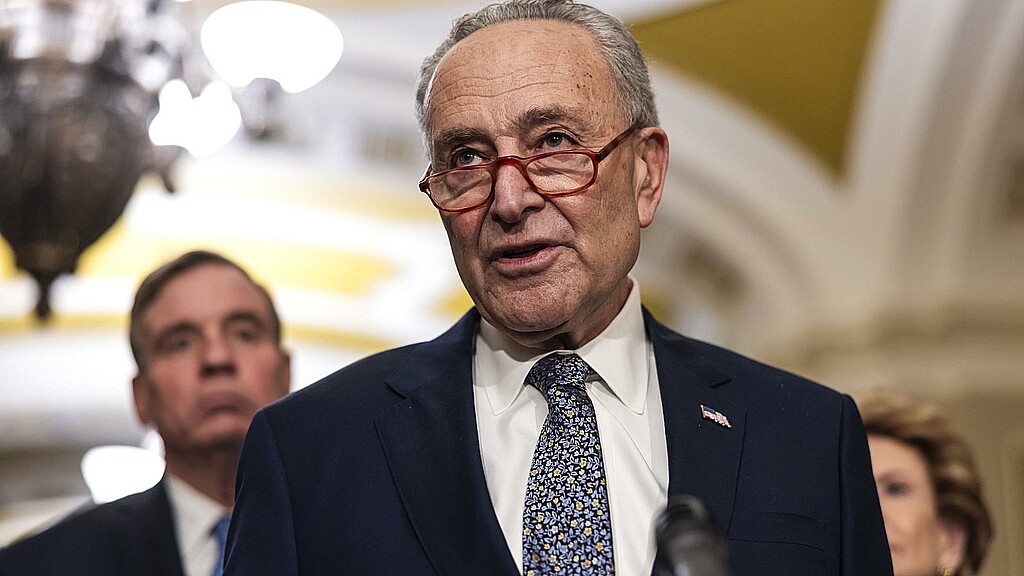Immigration
U.S. Senate releases bipartisan proposal on border security and military aid for Israel and Ukraine
The proposed legislation effectively restricts asylum at the U.S. southern border, marking a departure from established protocols that have been in place for decades

February 5, 2024 9:08am
Updated: February 5, 2024 9:08am
The United States Senate unveiled a bipartisan bill on Sunday aimed at addressing military and border security concerns, with a budget totaling $118 billion. The border deal and foreign aid package introduce stringent measures along the southern U.S. border that have not been codified into law.
The legislation effectively restricts asylum at the U.S. southern border, marking a departure from established protocols that have been in place for decades. The primary objective of this proposal is to discourage immigrants from crossing the U.S.-Mexico border.
If approved, the bill would signify a profound transformation of immigration law, marking the first substantial change in decades.
The foreign aid portion of the bill also includes substantial allocations, with $60 billion for military assistance to Ukraine, $14.1 billion for Israel, $4.8 billion for Taiwan, and $20 billion for bolstering border security. Johnson said he intends to present a standalone bill for a vote on the House floor next week, seeking $17.6 billion in emergency funding for Israel.
House Speaker Mike Johnson, a Republican from Louisiana, expressed strong criticism for the Senate's bipartisan $118 billion border security and foreign aid package upon the release of the agreement text on Sunday night. He said that the proposal is "even more problematic than anticipated" and predicted that it would face insurmountable opposition in the House of Representatives.
“I've seen enough,” Johnson wrote on X, formerly Twitter. "This bill is even worse than we expected, and won't come close to ending the border catastrophe the President has created. As the lead Democrat negotiator proclaimed: Under this legislation, 'the border never closes.'"
U.S. Senate Majority Leader Chuck Schumer said in a statement that the first procedural vote on this legislation is scheduled for next Wednesday.
The New York Democrat emphasized the significance of this bipartisan agreement, characterizing it as a pivotal step toward fortifying national security, both internationally and along the nation's borders. Schumer also underscored the crucial role this legislation plays in ensuring the future prosperity and security of the United States.
Schumer further explained that the bill provides substantial investments for national security designed to address escalating threats in the Middle East and the Red Sea, and that it equips Ukraine to confront challenges posed by Putin's regime, supports Israel in defending itself against existential threats, and extends humanitarian aid to innocent Palestinian civilians in Gaza.
The bill also aligns with global humanitarian efforts and strengthens allies in the Indo-Pacific region, countering Chinese influence.
President Biden commended the proposal in a statement, highlighting its potential to enhance border security, making the U.S.-Mexico border safer while preserving legal immigration. The president emphasized that this legislation would grant him new emergency authority to close the border during times of overwhelming influx.
In December, border officials processed over 300,000 foreign individuals, marking a record high for monthly immigrant entries.
For immigration purposes, the legislation introduces stricter criteria for migrants to qualify for asylum and increases detention capacity. It seeks to expedite asylum case resolutions at the border and establishes a new authority for the swift expulsion of immigrants who do not meet asylum criteria.
The bill now purportedly ranks among the top priorities for the Biden administration, as some have speculated it could have major consequences in the upcoming re-election considerations.
Nevertheless, the bill's approval faces a challenging journey ahead, as some lawmakers, primarily Republicans, have already expressed criticisms.
Even before the bill's unveiling, House Speaker Mike Johnson, a Republican, labeled the proposal as “dead on arrival” once it reaches Congress.
Immigrant rights advocates have also raised objections, as the bill excludes nearly 11 million undocumented immigrants, a group for whom Biden pledged to provide a pathway to legalization.
The National Hispanic Caucus of State Legislators (NHCSL) voiced its disagreements with various aspects of the bill, despite acknowledging some positive elements, such as the allocation of $2.34 billion for assisting newly arrived refugees. NHCSL expressed doubts about the fairness of the proposed accelerated asylum process and raised concerns about additional funding for the Operation Stonegarden (OPSG) Grant Program, which they believe may exacerbate harmful abuses.
Additionally, NHCSL emphasized that significant efforts to curtail immigration could negatively impact the economy.
The American Civil Liberties Union (ACLU) adopted a more critical stance, asserting that the agreement would compel the government to expel border-crossers without due process and restrict legal pathways for those in need.
The age old civil liberties organization argued that the bill falls short of promises to implement reforms providing avenues to citizenship for "Dreamers" and other long-term residents. Anthony Romero, ACLU's executive director, conveyed these concerns in a statement.
This report was published with information from EFE.










